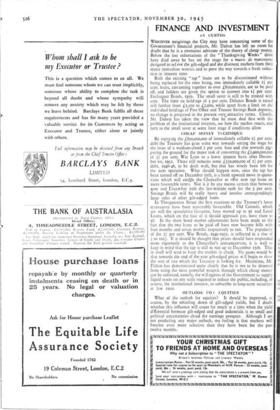FINANCE AND INVESTMENT
tci CUSTOS WHATEVER misgivings the City may have concerning some of the Government's financial projects, Mr. Dalton has left no room for doubt that he is a strenuous advocate of the theory of cheap money. Before the last exhortations of the "Thanksgiving Weeks" drive have died away he has set the stage for a masse de manoeuvre designed to relieve the gilt-edged and the discount markets from their major immediate worries and to pave the way towards a fresh reduc- tion in interest rates Both the existing " tap " loans are to be discontinued without being replaced for the time being, two immediately cglinble 23 per cent. loans, amounting together to over £650p00p00, are to be paid off, and holders are given the option to convert into ri per cent. Exchequer Bonds, 1950. The small saver is still to be treated with care. The limit on holdings of 3 per cent. Defence Bonds is raised still further from £1,500 to £2,000, while apart from a limit on the individual holdings of Post Office and Trustee Savings Bank deposits, no change is proposed in the present very. attractive terms.. Clearly, Mr. Dalton has taken the view that he must deal first with the problem of the institutional investor, see how the market reacts, and turn to the small saver at some later stage if conditions allow.
CHEAP MONEY TECHNIQUE
By repaying the £65o,000,000 of immediately callable 23 per cent. debt the Treasury has gone some way towards setting the stage for the issue of a medium-dated 2 per cent, loan and also towards poe- paring the ground for the major task of converting the £1,900,000,000 of 31 per cent. War Loan to a lower interest basis after Decem- ber Is% 1952. There still remains some £55o,000,coo of 21 per cent. debt, 1946-48, to be dealt with, but that has wisely been left for the next operation. What should happen now, once the tap has been turned off on December r5th, is a fresh upward move in quota- tions which will enalale the Chancellor to offer new tap loans on more favourable terms. Nor is it by any means certain that between now and December r5th the last-minute rush for the 3 per cent. Savings Bonds will be really heavy and involve correspondingly large sales of other gilt-edged loans.
In Throgmorton Street the first reactions to the Treasury's latest manoeuvre have been reasonably favourable. Old Consols, which are still the speculative fax ourite, have moved up to 91 and Local Loans, which on the face of it should approach par, have risen to 97. In the short bond market adjustments have been made to the fact that the two kans to be paid off have now become bills with four months and seven months respectively to run. The popularity of the 21 per cent. War Bonds, 1949-1951, is reflected in a rise of to roil. If it should be thought that prices should have responded more vigorously to the Chancellor's announcement, it is well to keep in mind that the tap is still to run up to December 15th. That in itself will tend to keep the market in check. My guess would be that towards the end of the year gilt-edged prices will begin to show the sort of rise which the Treasury is looking for. Meantime, Mr. Dalton has demonstrated quite clearly that he is not to be deterred from using the most powerful weapon through which cheap money can be enforced, namely, the willingness of the Government to supply liquid assets on any scale required to induce the public, including, of CLIIITSe, the institutional investor, to subscribe to long-term securities at low rates.
OUTLOOK FO t EQUITIES
What of the outlook for equities? It should be improved, of course, by the whittling down of gilt-edged yields, but I doubt whether this influence will count for much at a time when the yield differential between gilt-edged and good industrials is so small and political uncertainties cloud the earnings prospect. Although I am not predicting any major setback, my feeling is that markets will become even more selective than they have been for the past twelve months.






























 Previous page
Previous page